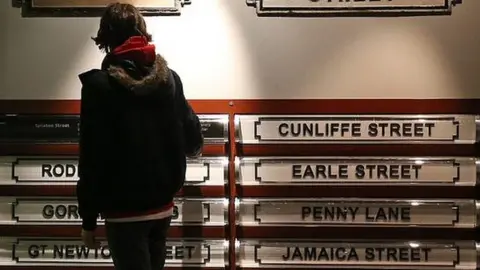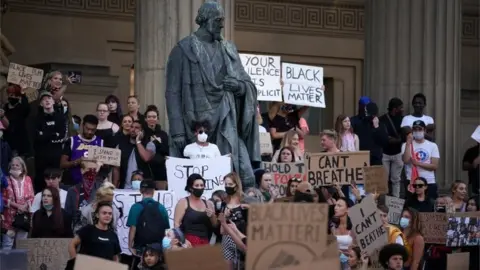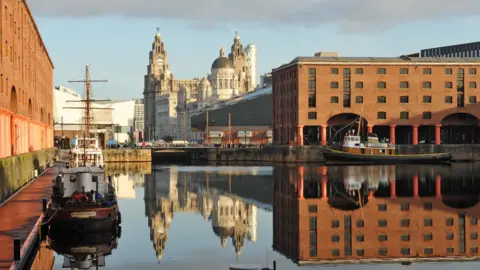Black Lives Matter: Liverpool 'not doing enough' over slavery links
 LSM
LSMLiverpool City Council is "not doing enough" to acknowledge the city's links with slavery, a historian has said.
Laurence Westgaph, who wants a memorial to slaves who "died and were buried" in Liverpool, said it was needed as the "public realm is the best classroom".
In January, the council said it planned to put up plaques to give an "honest account" of places linked to slavery.
Mayor Joe Anderson said coronavirus had delayed that plan, but acknowledged the council "haven't got everything right".
Much of Liverpool's 18th Century wealth came from the slave trade and, by the 1740s, the city was Europe's most-used slave port.
Many of its streets have names linked to slavery - Sir Thomas Street, named after the part-owner of one of the first slave ships to sail from Liverpool, and The Goree, which shares its name with an island off Senegal, was used as a base to trade for slaves.
 Getty Images
Getty ImagesIt is now home to the International Slavery Museum, which opened in 2007 with the aim of increasing "the understanding of transatlantic, chattel and other forms of enslavement".
Museum head Dr Richard Benjamin said in January that while he understood "the argument for placing street names in context", he thought it was important to consider changing road names instead.
'Lessons to learn'
Mr Westgaph, who produced Historic England's guide to Liverpool's slavery connections and advises Liverpool City Council about such issues, said he was broadly supportive of the plaque plan, as removing place names meant there was a chance "that history is forgotten", but added that he wanted the council to fulfil a 2012 promise to erect a memorial.
"The public realm is the best classroom," he said.
"People should have to engage with this history, whether they like it or not.
"Lots choose not to be confronted [and] a lot don't engage with the slavery museum."
He said a memorial was necessary because the slaves "deserve to be respectfully commemorated" and many were "not only interred without a marker, but without even their names".
He added that a council review panel on which he sits consisted of himself and two others and had only had one meeting.
A council spokesman said the review panel would issue a statement "in the next few days" about the council's plans and the proposals were "being looked at", but had been delayed by the Covid-19 lockdown.
He added that as a panel member, Mr Westgaph should raise his concerns within that forum.

Mr Anderson said the council "can do a lot more" to "educate, discuss and be proactive about real change".
"We've got lessons to learn [and] we haven't got everything right," he said.
He added that he did not "want people to feel uncomfortable walking past something every day that offends them", but said anyone who had a complaint should contact the council.
"If you want things removed, talk to me and we will discuss it," he said.
He added that he had set up a task group up to ensure people of black, Asian and minority ethnic heritage were better represented in the city's public services.
Mr Westgaph's comments follow Black Lives Matter protests in the city and the tearing down of a statue of slave trader Edward Colston in Bristol in response to the death of American George Floyd.
In a tweet, the museum said it was "happy to work closely" with the city of Bristol to ensure the statue "and this moment in history, is well documented and not forgotten".
